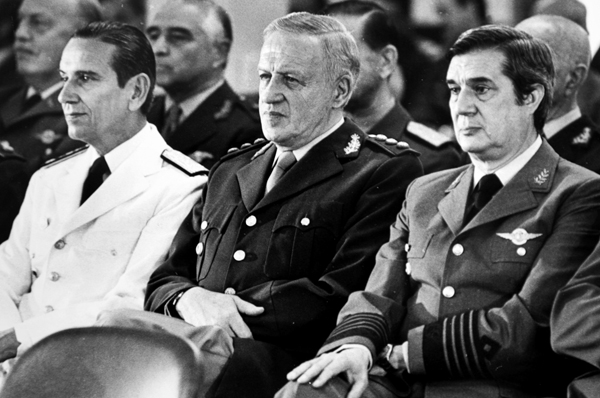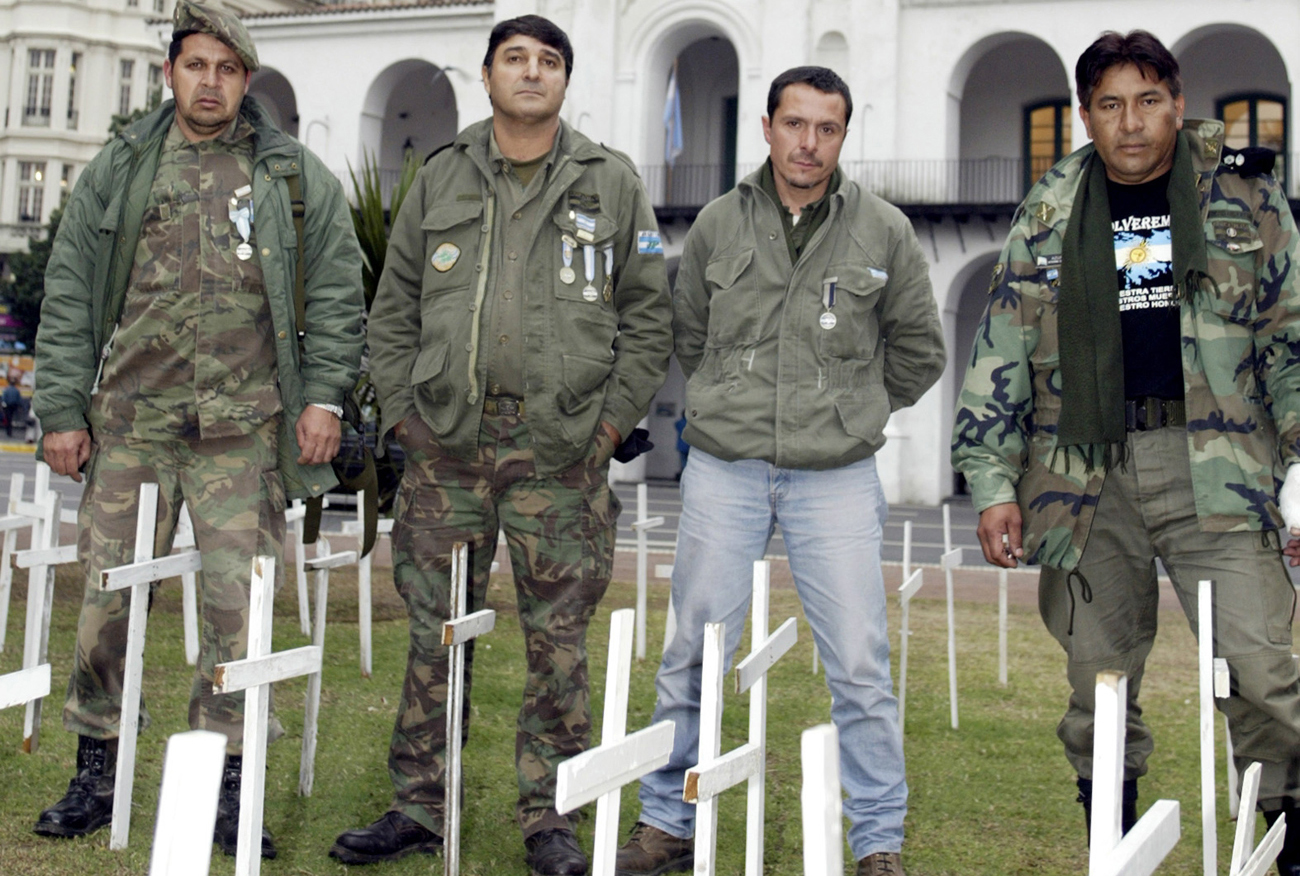In bitter fighting for which the UK forces travelled thousands of kilometres and carried out complicated in-flight refuelling manoeuvers along the way, the British military eventually ejected the Argentine troops and inflicted a disheartening defeat on them. That defeat, in turn, ultimately led to the toppling of the Argentine military junta that had ordered the invasion in the first place. While that dictatorship was reviled by most Argentines, three decades later the popular opinion remains clear: the Malvinas are theirs, not Britain’s.
Three decades after the invasion, while Argentina insists it will not use force this time around to gain control of the islands, tensions are again rising as the Latin American nation vows to end British sovereignty over the Falklands, this time via an aggressive, forceful diplomatic effort. Importantly, at stake now, besides national pride, are potentially large reserves of petroleum that have been discovered subsequently – as well as some very extensive fishing resources in the seas around the islands.
Argentina continues to assert it has a legal claim to the islands because it says it inherited this claim from the Spanish crown, after the Argentine colony gained its independence from Spain in the early 1800s. It has also based its assertion of sovereignty on the territory’s proximity to the South American mainland – and the obvious great distance of those islands from the nearest spot in the British Islands.
Britain, by contrast, argues its continued sovereignty and control are based on its long-term administration of the Falklands, since 1822, as well as the principle of self-determination for the islanders, almost all of whom are of British descent. To bolster its claim, the UK still has a significant military presence on the islands that includes Typhoon jet fighters and about 1,300 troops. In February, one of these was Britain’s Prince William, in his capacity as a search-and-rescue helicopter pilot with the Royal Air Force. William’s short-term, but highly visible deployment seems to have infuriated the Argentines.
The near-Antarctic, rainy, windswept and almost-treeless territory consists of two main islands, imaginatively named East Falkland and West Falkland, as well as hundreds of smaller islands and islets. As mentioned already, the maritime economic zone around the islands includes those oil exploration and exploitation fields, as well as some really rich fishing zones. In fact, five small companies are already looking for that proverbial big oil strike. British exploration firm Rockhopper Exploration says it has already found a pocket of oil worth about 450 million barrels, but believes there could be much, much more under those icy waters.
If the reserves ultimately prove to be economically viable for extraction, the recovery revenues might well offset the costs of British defence spending in the Falklands – about $320 million a year. Exploitable oil would also bring immigrants drawn by the economic prospects, creating yet another obstacle to Argentina’s claims. Or as David Hudd, chairman of Falkland Island Holdings says, “If there is commercial oil, it could also lead to an increase in population in one of the world’s least-populated places.” Oil strikes are clearly not going to make the dispute about the islands’ future less intense.
Historians say an English captain made the first landing there in 1690, and France and Britain then established small settlements on these less than salubrious islands – with the Spanish replacing the French in the late 18th century. (Recruitment for these colonies must have been one heck of a serious challenge in contrast to enticing settlers to Martinique, Bermuda, or the Bahamas.)
While the British drew down their settlement in 1774 on economic grounds, colonial historians say the UK never actually renounced its claim to sovereignty over the territory. And in 1811, faced with the insurmountable task of putting down colonial rebellions throughout Latin America, the Spanish abandoned their settlement as well, leaving the islands uninhabited, apart from occasional visits by British and US fishing vessels.
Nine years later, a newly independent Argentine state asserted its sovereignty over the islands and started a new settlement on the islands. The British re-established their control in 1833, backing up their earlier claim, expelling the Argentine garrison and encouraging the remaining settlers to return to the South American mainland. The British settlers then made up the islands' first continuous, permanent population – together with all those sheep the settlers were now tending.
While that all happened over a century and a half ago, the Argentines obviously haven’t forgotten this slight to national honour. Continuing to press their claim in various forums over the years, the UN eventually agreed to designate the territory a “colonial problem” and called for both nations to negotiate a solution. These talks continued for 17 years, but failed to resolve the question, thereby setting the stage for the 1982 Argentinian invasion after months of sabre-rattling. Their troops landed on the islands on 2 April to enforce their claim, after a group of Argentine scrap metal dealers had raised their national flag a few weeks earlier, on 19 March, as a poke in the British eye.
Appalled by Argentina’s capture of the Falklands, Prime Minister Margaret Thatcher ordered military forces to eject them from the islands. Following difficult fighting in ferocious weather conditions at sea, on land and in the air, the Argentine garrison commander in Port Stanley finally surrendered on 14 June. Though just 74 days long, the war had all the hallmarks of serious conventional warfare – sunken warships, firings of Exocet missiles, artillery bombardments, amphibious landings, aerial dogfights and the deaths of 655 Argentine and 255 British servicemen.

Photo: (From L-R) Admiral Jorge Anaya, president General Leopoldo Galtieri and Air Force Commander Basilio Lami Dozo, the three members of the military junta accused of negligence in the Falklands War (Guerra de Las Malvinas), are seated in a military court in Buenos Aires, on 11 November 1985. Some 1,000 people died during the war that began with Argentina's invasion of the disputed Islands on 2 April 1982, and ended with their expulsion by British forces on 14 June 1982. REUTERS/Pool.
After the war and the collapse of the Argentine dictatorship, the two nations eventually renewed diplomatic relations 22 years ago. But the status of the Falklands is in play again – what with ongoing disagreements about flights to and from the islands, as well as arguments over those all-important fishing rights.
From 2009, the issue has slowly moved back on to front-burner status after the UK rejected an Argentine call for new talks on the islands’ future sovereignty. Seven months after that, the Argentine parliament passed a law that set out the country’s claim to the Falklands, throwing in claims to the even more isolated South Georgia and South Sandwich Islands for good measure, a move that was inevitably rejected by the UK.
The unpleasant atmosphere over the territory ratcheted further upwards two years ago when a British petroleum exploration company began exploring for oil near the Falkland waters. Argentina responded to those drilling plans by requiring all ships travelling to the Falklands through Argentine waters to have a permit to make passage to the Falklands.
As the 30th anniversary of the war drew closer, the Argentine government attempted to increase pressure on Britain through efforts to persuade the other members of the big South American trading pact, Mercosur, to close their ports to any ships flying the Falklands ensign. In apparent response to the pressure, but in what the UK insisted was just a plain old garden-variety, “routine” ship deployment, they sent its brand-spanking-new destroyer, the HMS Dauntless, to the South Atlantic to patrol the Falklands coast. Unsurprisingly, Argentina then complained to the UN that the UK was “militarising” the region.
The Argentine industry minister then called on domestic companies to reduce British imports, and Argentina’s president, Christina Fernandez, has accused Prime Minister David Cameron of “near stupidity” for refusing to negotiate. Argentine political circumstances are now very different, but President Fernandez says her country is right to claim the islands that Argentine invaders were ultimately unable to hold after Margaret Thatcher sent a fleet of over 100 ships to recover it for the UK.
Of course, Argentina now has a democratic government that has condemned the military junta’s decision to invade the Falklands as a last-gasp effort to save its crumbling hold on power through a military adventure. With Argentina mired in economic stagnation, General Leopoldo Galtieri's campaign had attempted to rally support from large sectors of Argentine society through its bellicose acts. But as the US government had observed in what is a just-declassified, top-secret State Department intelligence analysis, “[Galtieri] wants to hold on to the Army's top slot through 1984 and perhaps the presidency through 1987. The Argentine leader may have been excessively shortsighted, however. The popular emotion that welcomed the invasion will subside.”
As part of Argentina’s diplomatic initiative, foreign minister Hector Timerman has also told the London and New York stock markets that oil exploration companies in the Falkland Islands could risk civil and criminal penalties for operating “illegally.” And in an interview late last year, he also said: “I think they have to realise that the Empire is dead. And at some point, they will have to accept to negotiate with us.” And that’s about where the toe-to-toe, nose-to-nose positioning over the Falklands stands as the anniversary commemorations of the war are poised to begin.
Not surprisingly, Argentine efforts have generated some backing from Venezuelan President Hugo Chavez – as well as actor Sean Penn. Penn told news media in Buenos Aires that “the world will not tolerate the ludicrous and archaic commitment to colonialist ideology” on the part of Britain.
In response to all this, over the past year and a half, the British have sent more than 30 diplomatic delegations to Latin America to explain London’s position. Cameron told Parliament: “The absolutely vital point is that we are clear that the future of the Falkland Islands is a matter for the people themselves. And as long as they want to remain part of the United Kingdom and be British, they should be able to do so.” Not surprisingly, Cameron’s position has been playing well in Britain. A recent Guardian newspaper poll showed 61% of respondents believe Britain should defend the Falkland Islands “no matter the cost.”
Of the people who live on the islands, well, they are self-reliant, independent, gutsy and neighbourly – especially with all the military hardware around to protect them. As the anniversary of the war approached, the New York Times described it thus: “Vast tracts of empty land or dangerously choppy waters separate one farm from another. The wind blows hard. The weather changes hourly. Most places are run by a handful of people, sometimes only a couple. If there are four school-aged children in a community, then they get a teacher. If not, they have to go to Stanley, or travel “north” (often to Britain) for their education. Yet, despite the sparseness, the links are strong: to the land — where many trace their ancestry back to the British sealers and whalers of the 1830s — and to one another.”
Besides a detachment of mixed cargo/passenger planes, there is also a ferry that sails between the two main islands as the main cross-island communication link – and here too one can see the possibilities of Argentine pressure. Given the islanders’ dependence on this ferry, the increasingly unfriendly attitude on the part of Argentina towards continued British rule is a new worry for the islanders. The ferry goes to Chile for yearly servicing – Argentine threats may mean it will need to sail around Cape Horn, a harrowing route where vessels much larger than the ferry have come to grief, or, alternatively, sail almost 2,000 kilometres north to Montevideo, Uruguay, for its yearly oil change.
Meanwhile, medical evacuations for around 80 patients a year have usually gone over the Andes to Santiago, Chile, or on to Montevideo, but there are now also reports that Chile’s LAN Airlines is being pressed to cancel its weekly flight to the islands. LAN is the only commercial operator that operates to and from the Falklands and it flights are a vital air bridge for the Falklands, as well as for shipments of fresh fruit and vegetables.
Inevitably, of course, Argentines come as tourists now too – including a growing number of veterans from the war eager to see the ground they fought over. One bed and breakfast operator in the capital, Stanley, explained Argentine visitors often say volveremos (we will return). Fortunately they seem to be saying they want to return as tourists rather than as invaders the next time around.
Over the weekend, an interesting sidelight to the Falklands War has come to light. For years, the US publicly maintained it adopted a neutral stance and acted as a disinterested mediator in the conflict until finally coming on board with the British. However, according to a large collection of formerly top-secret documents released yesterday by the National Security Archive (a non-government body working to declassify government documents to ensure a fuller study of foreign policy), the United States secretly supported the United Kingdom from the very start of the war in 1982.
As early as a London meeting of April 8, 1982, Thatcher expressed her concerns to US Secretary of State Alexander Haig about President Ronald Reagan's recent public statements of impartiality. In response, according to a memorandum of the conversation, “The Secretary said that he was certain the Prime Minister knew where the President stood. We are not impartial.”
As a supposedly impartial nation, the US had carried out a shuttle diplomacy effort that had Haig going to London and Buenos Aires frequently to try to de-escalate the conflict. Though the US did not formally announce support for the UK until April 30, the newly released documents show Washington sided with the British right from the get-go, and provided substantial logistical and intelligence support as well. Haig had told his British interlocutors that the American diplomatic effort “will of course, have a greater chance of influencing Argentine behaviour if we appear to them not to favor one side or the other.”
Under Thatcher's leadership, the UK’s large-scale military expedition was a logistical, communications and intelligence challenge for the British Air Force and Navy. It took almost a month before the British task force could reach the Falklands, ready for battle. At the beginning of the war, the State Department pessimistically projected “the effectiveness of the fleet, far from its maintenance bases, will rapidly deteriorate after its arrival on station. [Thatcher's] damaged leadership could not survive a futile 'voyage to nowhere’.” Wrong.
Meanwhile, Haig had told Reagan “The Prime Minister has the bit in her teeth. She is clearly prepared to use force. Though she admits her preference for a diplomatic solution, she is rigid in her insistence on a return to the status quo ante, and indeed seemingly determined that any solution involve some retribution.” And these newly declassified documents also explain initial US covert support was already being discussed. In her first meeting with Haig on April 8, “[Thatcher] expressed appreciation for US co-operation in intelligence matters and in the use of [the US military base at] Ascension Island.”
After the Argentine expeditionary force was defeated, the effect of the victory on the British people was nothing short of astonishing. The Telegraph reported, “It was a minor skirmish in a remote part of the world, but Margaret Thatcher’s triumph in liberating the Falkland Islands in 1982 set the seal on Britain reclaiming its status as a major world power. You have only to look at the crucial role British forces play today on the battlefields of Iraq and Afghanistan to grasp the significance of the legacy Margaret Thatcher created with her momentous victory in the Falklands in 1982. Now it is almost taken for granted that Britain will be a key player in tackling the big issues of the day, whether it is waging war on Islamist militants in the Middle East and beyond, guaranteeing Kosovan independence or eradicating child poverty in Africa.”
Victory in the Falklands War gave a surprising jolt of patriotism to the British. Together with Thatcher’s crushing of Arthur Scargill’s coal miners, the war helped create the legend and the reality of Thatcher’s prime ministership as the work of an Iron Lady – and the subtext for the Meryl Streep film as well.
So that readers can get with the spirit of the thing, join in for that great Colonel Blimp of a rousing chorus from the closing of Gilbert and Sullivan’s HMS Pinafore, substituting, wherever necessary, “she” for “he” of course:
He is an Englishman!
For he himself has said it,
And it's greatly to his credit,
That he is an Englishman!
For he might have been a Roosian,
A French, or Turk, or Proosian,
Or perhaps Itali-an!
But in spite of all temptations
To belong to other nations,
He remains an Englishman!
– By J. Brooks Spector
DM
Read more:
- Hostile Place, Neighborly Ties in The New York Times.
- Regions and territories: Falkland Islands on the BBC.
- Argentina on new campaign to win Falklands, 30 years after war at the Washington Post.
- 30 years after Argentina and Britain fought over Falklands, the land and people remain scarred at the Washington Post.
- Reagan on the Falklands/Malvinas: “Give Maggie enough to carry on” at the National Security Archive Electronic Briefing Book No. 374.
- Falkland Island Government website.
- Falkland Islands entry at the CIA World Factbook.
- Argentina Says Britain Is Raising Tensions at The New York Times.
- Falkland Islands 'will belong to Argentina one day' says minister at The Telegraph.
- Margaret Thatcher and the Falklands at The Telegraph.
- Falkland Islands thriving 30 years after war at the BBC.
- Falklands Islands 30 years on: 'I naively thought the Argentine problem was sorted that day, but now they are causing all sorts of trouble again.' At The Telegraph.
- Iron Lady film draws sympathy for Thatcher in Argentina at Reuters.
Photo: Argentine Veterans of the 1982 Falklands war (L-R) Rolando Vargas, Marcelo Torres, Nestor Panigazzi and Jose Azuaga pose at the Plaza the Mayo square, near the Casa Rosada government palace in Buenos Aires, on 28 July 2004. More than 300 of their fellow veterans have killed themselves since Argentina's ill-fated 1982 invasion of the remote south Atlantic island cluster, and survivors are making a desperate plea for help. Marginalised on their return home from war, many veterans have been unable to hold down a steady job. Argentina's worst ever economic crisis in 2001 and 2002 has only made things worse, putting work and good health care further out of reach. REUTERS/Santiago Pandolfi.






